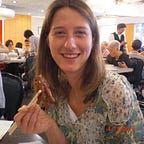Shawn Rubenfeld’s The Eggplant Curse and the Warp Zone
Failed academic Joshua Schulman is in a bad way. Grieving his mother’s death and the end of his marriage, he turns his avocation of retro video game collecting into a full-blown addiction. When a prep school in Eastern Iowa recruits him for a teaching job on the strength of a long-ago published online article from his grad school days, Joshua claims to still be chasing his PhD and gets hired. Moving from Brooklyn to Roll, Iowa (population 1,412), he finds that his troubles are just beginning.
From Joshua’s pursuit of a married faculty member to the school’s cultic obsession with a cat-and-mouse playground game called Splat, The Eggplant Curse and the Warp Zone is a hilarious romp steeped in strange places, where frenetic anxieties, secrets, and obsessions intersect.
Here’s an interview with Shawn Rubenfeld about his new book:
Timothy Schaffert described your novel’s protagonist as, among other things, ‘resisting adulthood.’ Do you think that’s accurate? What’s the difference between being sweetly child-like and juvenile and childish?
It is accurate. When readers meet Joshua, my novel’s protagonist, he’s a mess. His mother has died, his marriage is in shambles, and his dissertation has been left untouched. As a way to cope, he turns to playing and collecting retro video games, a hobby that quickly consumes him. One reason he turns to these games is because he played them so often as a child and they bring him nostalgic comfort. They also manage to momentarily distract him from his real-life difficulties (one reviewer, Moaazam Sheikh, rightly referred to Joshua’s reflection that he played these games so often as a child as a nod to parental negligence). The novel explores how he learns to move beyond the pain of his past and into a new future, while also speaking to the many ways that grief complicates our quest for renewal. The difference between childlike and childish lies in the words themselves. Childlike is marked by innocence and childish is marked by immaturity. I wouldn’t personally classify Joshua as either (though of the two he’s closer to childish than childlike). As Timothy highlighted elsewhere in his blurb, Joshua is a “man of his generation,” and his resisting adulthood and seeking solace in nostalgia are more indicative of the prolonged adolescence often characteristic of millennial angst.
Is your book in any way inspired by, or a satire of, academic life and teaching at universities?
The novel can certainly be read as a satire of academia, but I didn’t intend it that way. Or at least that wasn’t one of my primary considerations. When I write, I often think about what I want to see happen if I were reading. Almost always this exercise leads me back to character, maybe because the novel is such a great vehicle through which to explore character and it is our interest and investment in the characters who populate the pages of our novels that often keep us reading. I had a sense of what Joshua’s inner journey would be from the very beginning and it just so happens that — possibly because of my own life in academia and the stops and starts of Joshua’s own voyage there — he finds himself back in the classroom as he pinballs along that inner journey, though this time at a boarding school for gifted students. But unlike some of the more notable novels of college parody (many of which I greatly admire), my novel doesn’t focus primarily on the institution itself, as vividly as I attempted to paint that institution.
At what point does tragedy become tragicomedy? What makes something that’s sad become darkly funny?
It varies reader to reader. For me, part of it depends on the tone of the piece — the placement of jokes or dry, understated humor to lighten the telling of the story as the narrative progresses, despite the tragic nature of plot elements. I also think absurdity, which is something I utilize here with the auxiliary characters, lends itself to dark comedy. I never intended to write toward that absurdity. But there was a point when writing when I decided that I had to because there is something absurd about being a stranger in a strange land and so I embraced those moments and worked hard to find the right balance between the veneer of realism and those windows into the absurd. I found that these elements were consistent with the established tone of the piece and the disillusionment of my protagonist, which can also be seen as characteristic of tragicomedy.
Shawn Rubenfeld’s The Eggplant Curse and the Warp Zone can be ordered here from 7:13 Publishing.
